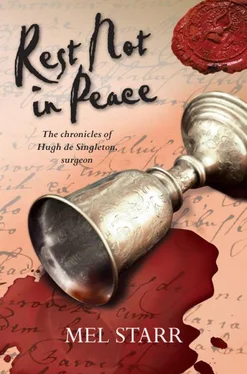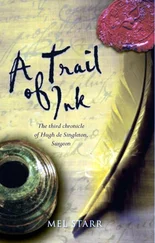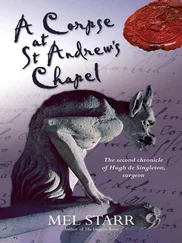Mel Starr - Rest Not in Peace
Здесь есть возможность читать онлайн «Mel Starr - Rest Not in Peace» весь текст электронной книги совершенно бесплатно (целиком полную версию без сокращений). В некоторых случаях можно слушать аудио, скачать через торрент в формате fb2 и присутствует краткое содержание. Год выпуска: 2013, Издательство: Lion Fiction, Жанр: Исторический детектив, на английском языке. Описание произведения, (предисловие) а так же отзывы посетителей доступны на портале библиотеки ЛибКат.
- Название:Rest Not in Peace
- Автор:
- Издательство:Lion Fiction
- Жанр:
- Год:2013
- ISBN:нет данных
- Рейтинг книги:4 / 5. Голосов: 1
-
Избранное:Добавить в избранное
- Отзывы:
-
Ваша оценка:
- 80
- 1
- 2
- 3
- 4
- 5
Rest Not in Peace: краткое содержание, описание и аннотация
Предлагаем к чтению аннотацию, описание, краткое содержание или предисловие (зависит от того, что написал сам автор книги «Rest Not in Peace»). Если вы не нашли необходимую информацию о книге — напишите в комментариях, мы постараемся отыскать её.
Rest Not in Peace — читать онлайн бесплатно полную книгу (весь текст) целиком
Ниже представлен текст книги, разбитый по страницам. Система сохранения места последней прочитанной страницы, позволяет с удобством читать онлайн бесплатно книгу «Rest Not in Peace», без необходимости каждый раз заново искать на чём Вы остановились. Поставьте закладку, и сможете в любой момент перейти на страницу, на которой закончили чтение.
Интервал:
Закладка:
Ranulf lifted the thin rod before Sir Roger and me, and I reached out and took it from his tool.
“What was that there for, d’you suppose?” Ranulf said. “Lampstand didn’t need no bracin’.”
The bodkin or awl or whatever it once was had been filed to a needle-point. No wooden sphere covered the blunt end, but somewhere in the castle or nearby I was sure such a ball might be hid or discarded. There was no need for so sharp a point on a rod unless it was made to plunge through some other thing, and a larger surface against a man’s hand than just the blunt end of the rod would be needed for that work.
“Speak to no man,” I said to the farrier, “of what has been found here.”
“Aye… What is it, an’ why was it there?”
“Don’t know of a certainty. But when we learn of it we will tell you. Until then, keep silence.”
The farrier tugged a forelock when Sir Roger and I turned to go, me with the iron pin in my hand and Sir Roger with the lampstand. The bodkin was a bit longer than my longest finger. This was likely long enough to penetrate a man’s brain if thrust through his ear. Was this the thing we were to seek, which the crudely written message had advised us of? This seemed likely.
Dinner was finished when we entered the hall. Grooms and valets had already completed their meals and departed, and Lord Gilbert and Lady Petronilla were standing at their places at the high table. Lord Gilbert saw us enter the hall, saw the lampstand in Sir Roger’s hand, and raised an eyebrow. The bodkin in my hand was too small to be seen across the hall.
The others who yet remained at the tables had stood when Lord Gilbert did so, and I watched the squires to see if one would flinch to see the sheriff holding forth the lampstand wherein he had hidden a murder weapon.
Conversation in the hall faded as first Lord Gilbert, then the others watched us enter and approach the high table. The squires also fell silent, curious expressions upon their faces as they saw Sir Roger approach Lord Gilbert with a common lampstand which must have seemed similar to the one they had last seen in their chamber. Neither youth showed any sign of fear or apprehension. Their expressions were bland; no furrowed brows, darting eyes, or chewed lips. One of these squires, or both, I thought, should be a traveling player.
“What is this?” my employer asked when Sir Roger stood before him.
“Master Hugh has discovered…”
“A lampstand, m’lord,” I interrupted Sir Roger. I did not know what more than that the sheriff might say, but thought the less others in the hall knew of the stand, where it was found, and what was discovered within it, the better.
“I can see that,” Lord Gilbert sighed, “but why have you brought it to the hall in the middle of the day when no light is needed?”
“We will explain in the solar, m’lord,” I said.
“Very well. Come.”
Lord Gilbert left his place and strode toward the stairway which led to the solar and adjacent chambers. As I passed the high table I saw Lady Margery’s eyes fall to my hand and the slender shaft of iron I held. Neither of the squires had shown any dismay at the appearance of the lampstand, but the Lady Margery seemed to stagger back a step when she saw what I carried, before she steadied herself with a hand against the linen covering of the high table. Her eyes lifted to mine, she fixed me with a brief, haughty glare, then turned to speak to Lady Petronilla.
“Whence came this lampstand?” Lord Gilbert asked when we had entered the solar and closed the door behind us.
“’Twas in the squires’ chamber,” the sheriff replied. “And ’tis no common lampstand.”
Sir Roger upended the stand, pointed to the base, and said, “Look there.”
Lord Gilbert did so, looked to Sir Roger, then to me, and said, “What am I to see? Is there something remarkable about the thing?”
“Do you see the hole in the center of the stand?” I said. “We drew this from it.”
I held out the iron bodkin and Lord Gilbert took it from me. “Too fine to be a nail,” he said, “and no head. Why was it in the stand?”
“’Twas hid there,” Sir Roger said. “Show Lord Gilbert the message again that put us on the trail.”
Reading is not a task which comes easily to Lord Gilbert, although he does possess a most excellent book of hours to aid his devotions. He once read well, but many folk of his age must hold a document at arm’s length, or admit the frailty of age and seek spectacles in London. And the note was written in a poor hand. As my employer scowled at the parchment I repeated what words were there.
“Was this used to slay Sir Henry?” he said, peering at the tool with some distaste.
“It may be,” I replied. “If so, ’twas wiped clean when the deed was done. There is no trace of blood upon it.”
“Plenty of blood on the cloth that was stuffed up the chimney,” Sir Roger said.
One of Lord Gilbert’s eyebrows lifted. “A bloody cloth?”
“Aye. Hidden above the fireplace in the squires’ chamber,” I said. “A corner of it fell free, so ’twas visible.”
I withdrew the cloth from my pouch and held it forth for Lord Gilbert’s inspection. He studied it intently, but would not take it from me.
“So one, or both, of these squires is guilty of murder?”
“Likely,” Sir Roger replied.
Lord Gilbert peered at me. “How will you discover which has done this felony?”
“Take ’em both to the dungeon at Oxford Castle, ’til they confess the deed,” the sheriff advised.
“What say you, Hugh?”
I dislike contradicting my betters, but it seemed to me such a course would not be effective.
“The squires will protest their innocence,” I said, “but after a few days in the dungeon, or perhaps a week, they will confess all.”
“See,” Sir Roger said. “Your bailiff agrees. I’ll send my sergeants to arrest the fellows.”
“They will confess,” I continued, “that the other is guilty. It is unlikely that any man will admit himself a felon when to do so will send him to a noose. Each will deny the crime and try to entangle the other in it.”
“Mayhap they are both guilty,” Sir Roger said. “The King’s Eyre may find it so.”
“It may be, but our only clues are insubstantial.”
“What?” Lord Gilbert said. “A bloody cloth, a murder weapon, and a note which told Sir Roger where these might be found. These are insubstantial?”
“Evidence enough,” the sheriff growled.
“What if this iron pin was used for some other purpose and did not slay any man? And who left the message under your door? One of the squires?”
Sir Roger shrugged.
“If one squire had informed against the other, he would, I think, write of which was the felon and which was not, else he would know that his own life was at risk.”
“Mayhap someone saw them approach Sir Henry’s door in the night,” Lord Gilbert offered.
“Why not say so? Why send this riddle to Sir Roger in the night? What harm could come to a man who would tell of what he saw?” I said.
“Perhaps he feared that someone might ask what he was doing prowling about the castle so late at night,” Lord Gilbert said.
“The garderobe is not far from Sir Henry’s chamber.”
“Ah,” Sir Roger said, “just so. What then, are we to allow a guilty man to escape a just punishment?”
“Nay. But we must be careful that the punishment is meted out to the guilty and none other.”
“Innocent men often suffer for the deeds of others,” Sir Roger said. “Why so troubled about perhaps one more?”
“If the innocent are afflicted because of the deeds of evil men, or because of God’s choice, then I am free from censure. But no blameless man, nor woman either, should suffer because you, or I or Lord Gilbert, are too slothful to do justice.”
Читать дальшеИнтервал:
Закладка:
Похожие книги на «Rest Not in Peace»
Представляем Вашему вниманию похожие книги на «Rest Not in Peace» списком для выбора. Мы отобрали схожую по названию и смыслу литературу в надежде предоставить читателям больше вариантов отыскать новые, интересные, ещё непрочитанные произведения.
Обсуждение, отзывы о книге «Rest Not in Peace» и просто собственные мнения читателей. Оставьте ваши комментарии, напишите, что Вы думаете о произведении, его смысле или главных героях. Укажите что конкретно понравилось, а что нет, и почему Вы так считаете.












